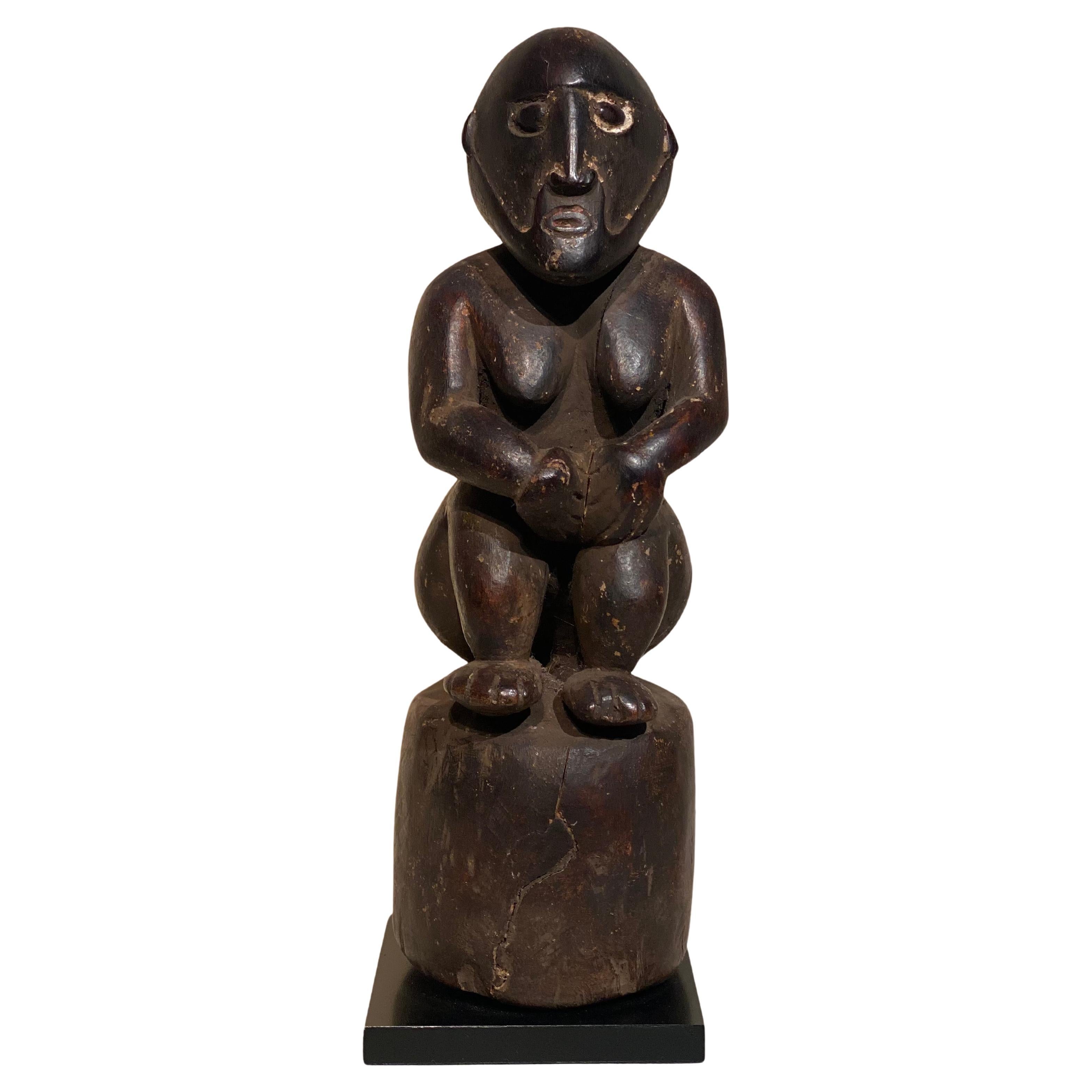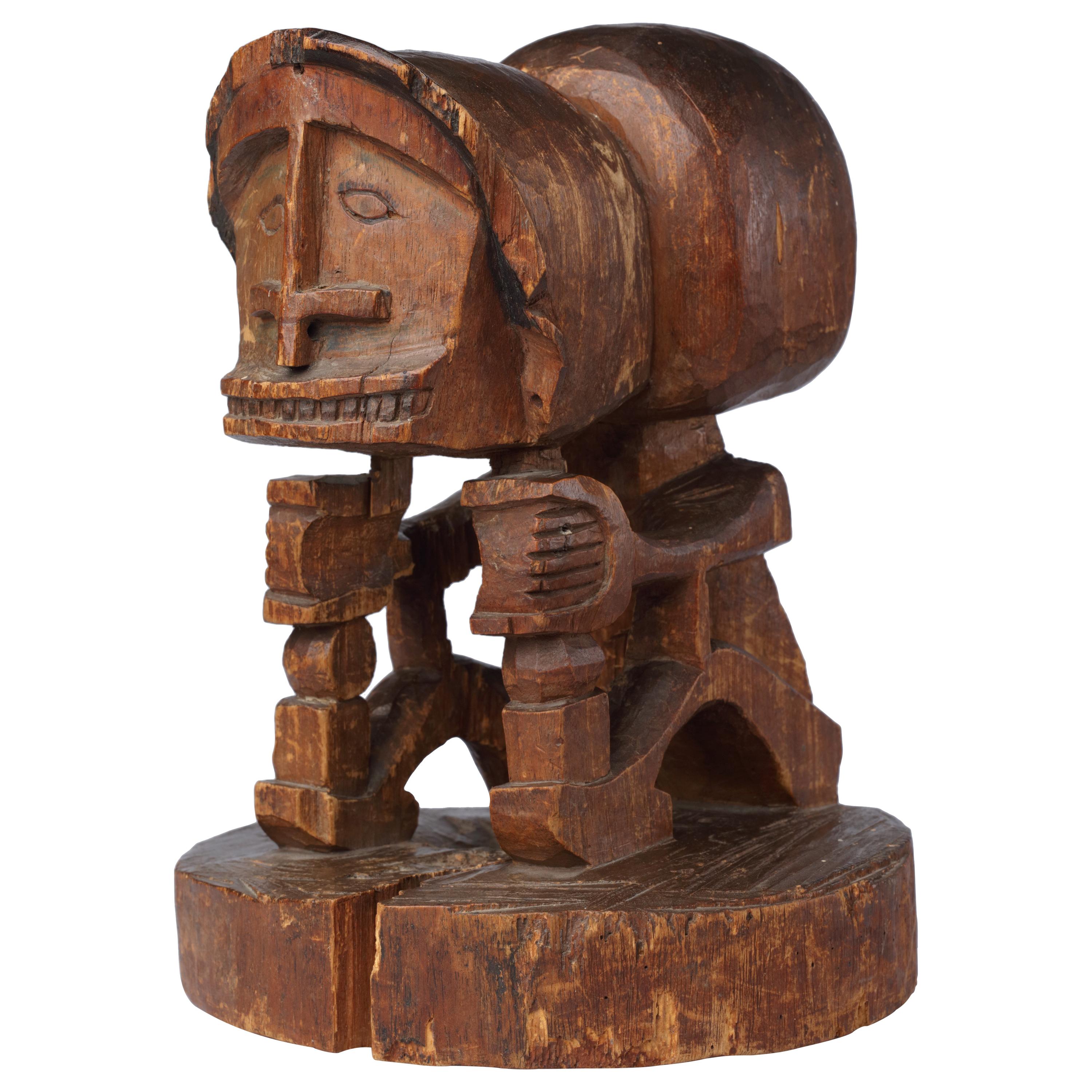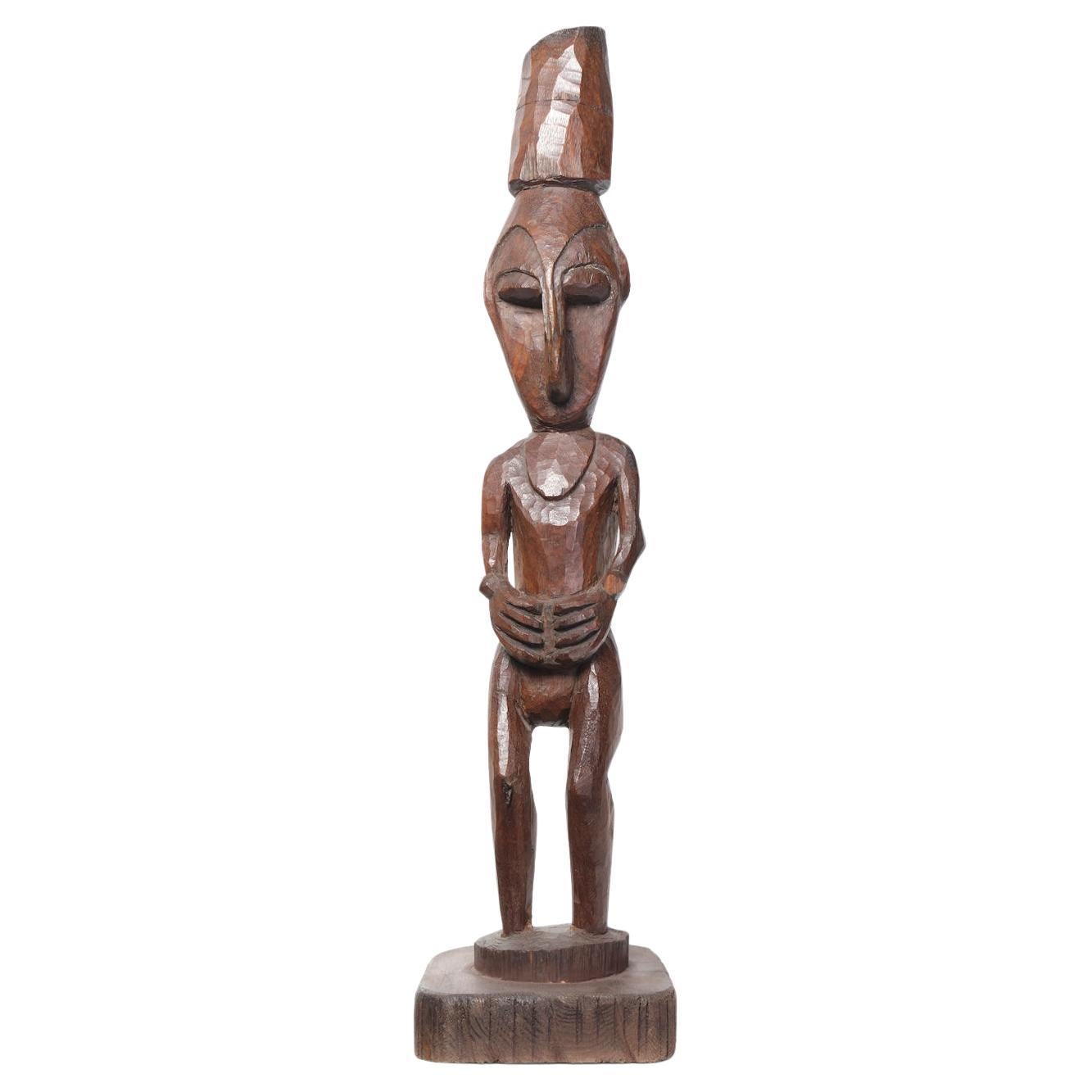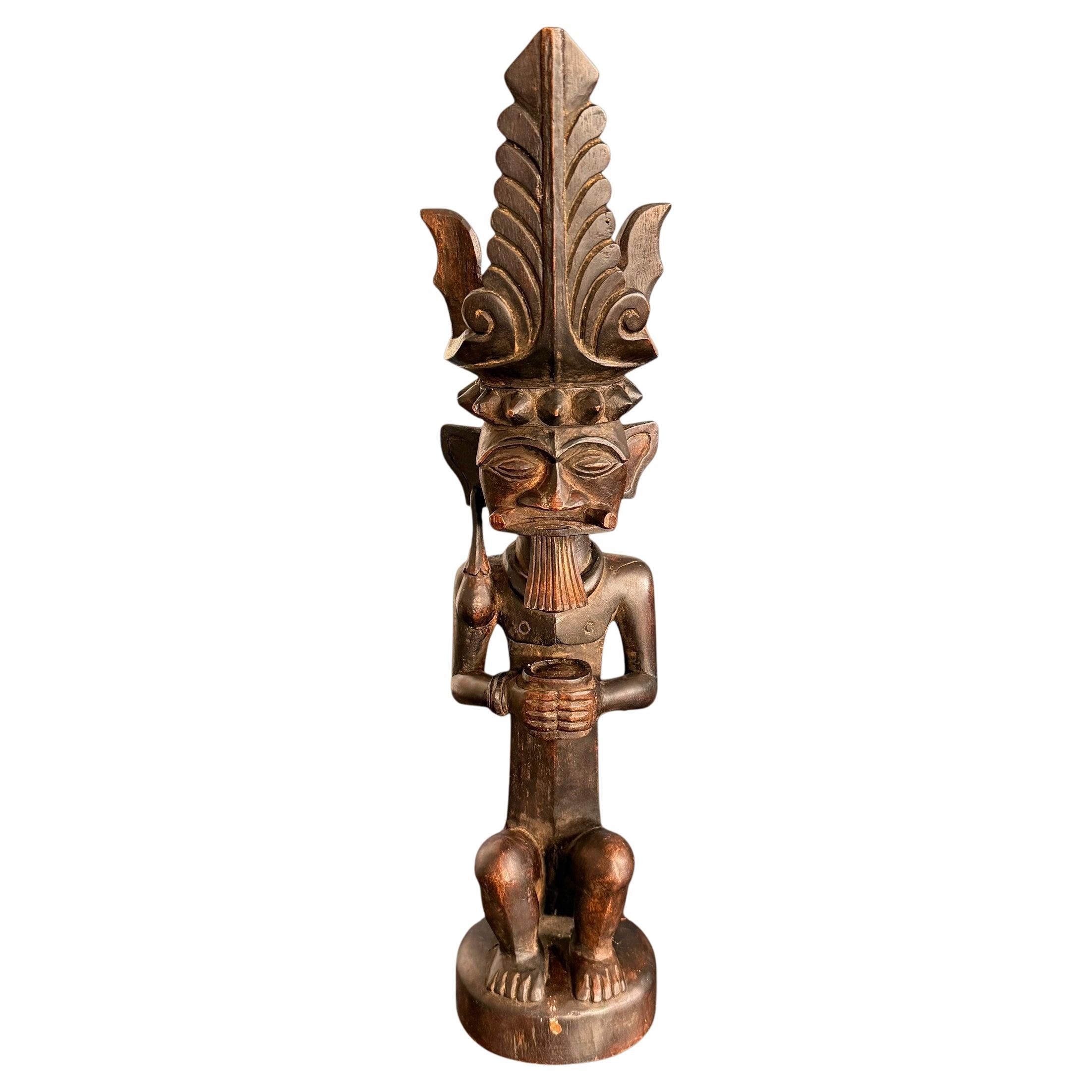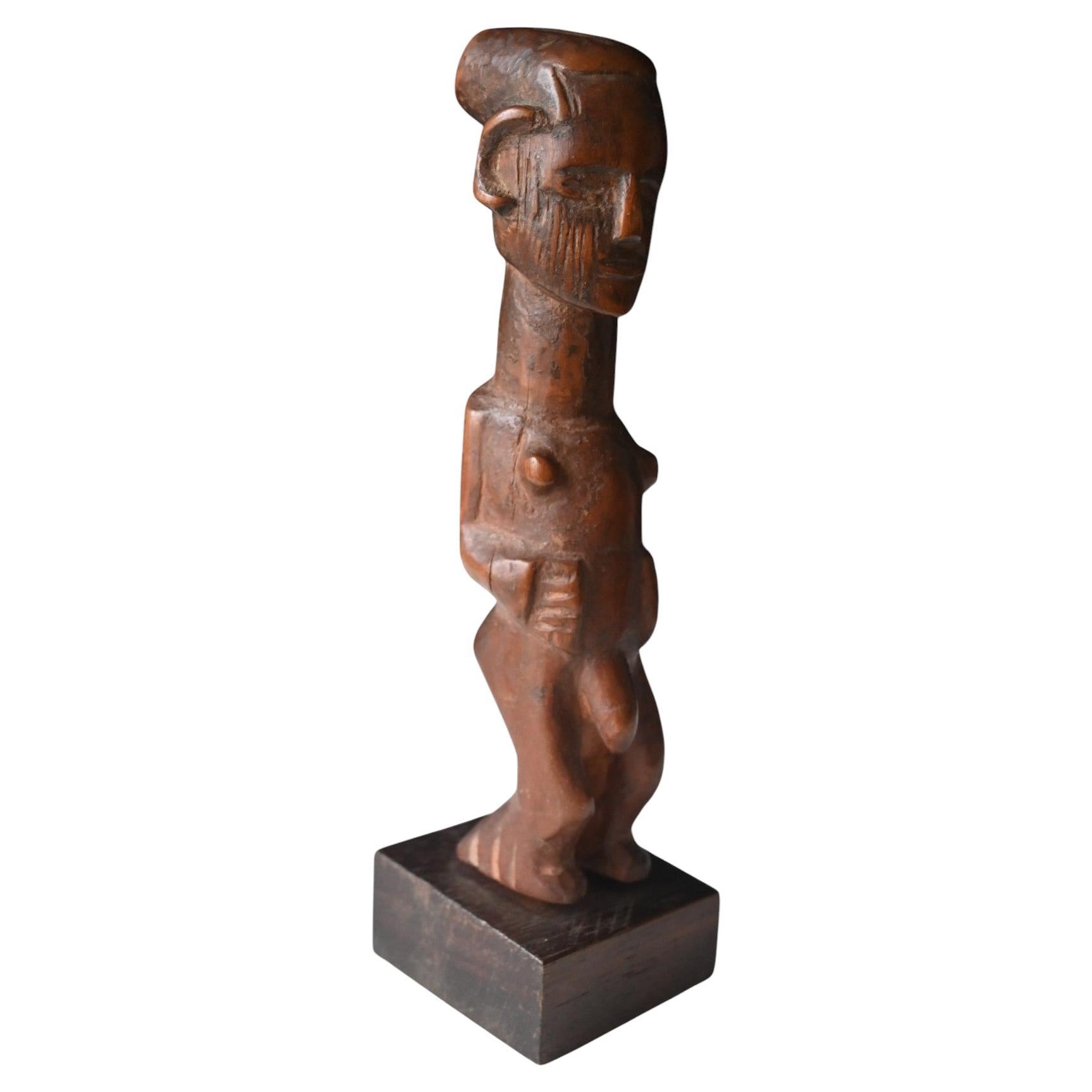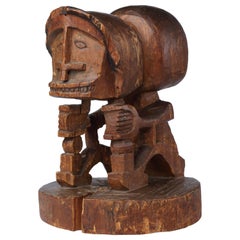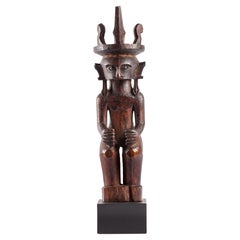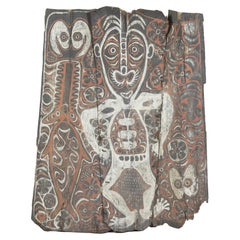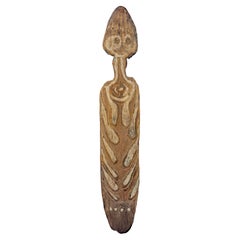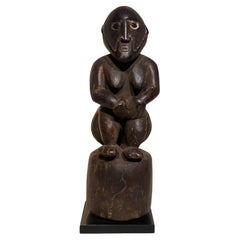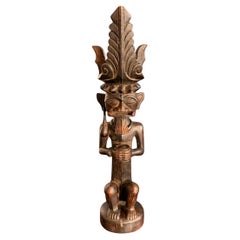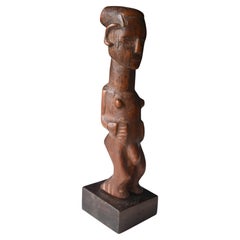Items Similar to Early Papua Korwar Statue, Collection of Missionary Starrenburg, Collected 1909
Want more images or videos?
Request additional images or videos from the seller
1 of 6
Early Papua Korwar Statue, Collection of Missionary Starrenburg, Collected 1909
$19,170.30
£14,268.39
€16,000
CA$26,258.51
A$29,205.20
CHF 15,250.05
MX$355,396.23
NOK 194,766.39
SEK 182,656.51
DKK 121,802.41
Shipping
Retrieving quote...The 1stDibs Promise:
Authenticity Guarantee,
Money-Back Guarantee,
24-Hour Cancellation
About the Item
A Papua wood figure of a Korwar
North West Irian Jaya, Vogelkop area, coastal Geelvink Bay, present-day Cenderawasih Bay, early 20th century
The seated Korwar is holding an openwork “shield” in front of him, with a dark brown soft gloss patina.
Measure: H. 34 cm
Provenance:
From the collection of Missionary D.B. Starrenburg, working in the Geelvink Bay area, on the peninsula of Roon, from 1906 till 1938 and thence by descent to the last owner in December 2019.
Starrenburg published a booklet about his mission on Roon and described how he got the Korwar:
"Around the hut, there were skulls and small ancestor sculptures (called Korwar). As the owners wanted to become Christians, I could take everything, but I wasn't allowed to take them away through the front door, so a hole was made in the side of the hut. Onboard of my little boat, a storm came up and I nearly lost everything. The Papua attributed this happening to the power of the spirts, but I came home with everything safely anyway!"
Starrenburg is also referred to as being on Roon circa 1910 in the famous book ' Kruis en Korwar' by Drs. F.C. Kamma.
Literature:
D.B. Starrenburg, Kerk der Hope: bijdrage tot kennis der Nieuw-Guinea Zending, Nederlandsch Jongelings-Verbond, Amsterdam, 1940.
Note:
The shield may stand for bravery, or it may offer supernatural protection. Korwar is the name of a specific type of figurative sculpture, representing an ancestor, made by different groups of people with their distinct names and cultural identities, but all living in the “Vogelkop”, Kepala Burung, area
of Irian Jaya. Korwar provides the link between the worlds of the dead and the living and, as in most Oceanic cultures, are consulted for advice and help in all significant life events such as births, marriages and deaths. It could also offer protection and success on head-hunting raids, on dangerous sea journeys and when curing people.
From the late 1880s onwards, many korwar images were destroyed upon the instigation of Protestant missionaries, but some missionaries also collected korwar taken from Papuas after their conversion to Christianity.
- Dimensions:Height: 13.39 in (34 cm)Width: 5.12 in (13 cm)Depth: 5.52 in (14 cm)
- Style:Tribal (Of the Period)
- Materials and Techniques:
- Place of Origin:
- Period:
- Date of Manufacture:circa 1905
- Condition:Wear consistent with age and use.
- Seller Location:Amsterdam, NL
- Reference Number:1stDibs: LU5458220874622
About the Seller
5.0
Recognized Seller
These prestigious sellers are industry leaders and represent the highest echelon for item quality and design.
Established in 1985
1stDibs seller since 2020
23 sales on 1stDibs
Typical response time: 2 hours
- ShippingRetrieving quote...Shipping from: Amsterdam, Netherlands
- Return Policy
Authenticity Guarantee
In the unlikely event there’s an issue with an item’s authenticity, contact us within 1 year for a full refund. DetailsMoney-Back Guarantee
If your item is not as described, is damaged in transit, or does not arrive, contact us within 7 days for a full refund. Details24-Hour Cancellation
You have a 24-hour grace period in which to reconsider your purchase, with no questions asked.Vetted Professional Sellers
Our world-class sellers must adhere to strict standards for service and quality, maintaining the integrity of our listings.Price-Match Guarantee
If you find that a seller listed the same item for a lower price elsewhere, we’ll match it.Trusted Global Delivery
Our best-in-class carrier network provides specialized shipping options worldwide, including custom delivery.More From This Seller
View AllEarly Papua Korwar Ancestor Figure, Early 19th Century, Deep Black-Brown Patina
Located in Amsterdam, NL
An extremely rare Papua wood sculpture of a Korwar
Papua New Guinea, Cendrawasih Bay, Wandammen, early 19th century
Measures: Height 24 x Diameter 18 cm
Finely carved in th...
Category
Antique Early 19th Century Indonesian Tribal Tribal Art
Materials
Wood
$113,823
Free Shipping
A Nias 'Adu Zatua' wooden ancestor sculpture
Located in Amsterdam, NL
Indonesia, Nias, 19th century
H. 37.5 x W. 10 cm
Sculptures like the one present are not only decorative items but are believed to be vessels that house the spirits of ancestors and are used to communicate with them.
After the death of a person a wooden image or Adu Zatua was made to mediate between the human world and the spiritual realm. These kinds of figures were commissioned by noble Nias families, whereas simple and lesser quality carvings generally were found among lower class families.
In this particularly fine example, the sculptor has paid careful attention to the proportions of the different parts of the body, dividing it into three main sections – the head, the torso, and the legs. The shapes are sometimes flat, round, or have notches, but all are perfectly in balance creating a certain divine tranquillity. This Adua Zatua’s ears are decorated with earrings, and it is wearing a headdress, pointing towards a chiefly provenance.
In 1914 the Dutch gained complete control of the island of Nias and started spreading Protestant Christianity. Many ancestor statues...
Category
Antique 19th Century Indonesian Tribal Art
Materials
Wood
A Sepik 'panggal' sago spathe or tree bark painting of an ancestral figure
Located in Amsterdam, NL
East-Sepik Province, Keram River, early 20th century
The painting in non-binded pigment on sago spathe, bark of a sago palm, depicts an ancestral figure surrounded by a saw fish...
Category
Early 20th Century Papua New Guinean Tribal Art
Materials
Wood
A rare Papua 'Gope' Spirit board from the Schulze Westrum collection
Located in Amsterdam, NL
A rare Papua 'Gope' Spirit board from the Schulze Westrum collection
New Guinea, Papua Gulf, probably Minagoiravi, Wapo River, late 19th–early 20th century
H. 130 x W. 24.5 cm
Pro...
Category
Antique Late 19th Century Papua New Guinean Tribal Art
Materials
Wood
Splendid Indo-Portuguese Colonial Sculpture of Nagini from Goa, 17th Century
Located in Amsterdam, NL
A fine Indo-Portuguese inlaid teak wood figure of Nagini
India, Goa, 17th century
Measure: H. 55 cm
(with stand, and with ring for wall hanging)
The sculpture can be perceived as such but probably is one of four legs of an Indo-Portuguese contador...
Category
Antique 17th Century Indian Jewelry Boxes
Materials
Teak, Ebony
An ancient Papua wooden substitute headhunters's head
Located in Amsterdam, NL
Papua New Guinea, 18th-19th century
L. 22.5 x W. 18 cm (approx.)
Provenance:
Collected by Schulze-Westrum
Collection Rinck Hollnberger, Munich (purchased in the 1980s or 1990s)
For a comparable skull see the collection of the Metropolitan Museum of Art in New York.
The heads of humans and of animals such as crocodiles and pigs formerly played integral roles in the ceremonial life of Papuan Gulf peoples, who considered the heads to be vessels of life-giving supernatural power. Within men’s ceremonial houses, human skulls were displayed, together with sacred images such as spirit boards or gope, by the members of each clan in a specially constructed clan shrine. However, not all heads required the death of an enemy. In some areas, heads made from wood or other materials appear to have had powers equal to actual ones. In contrast to skulls, the facial features of wood heads were sometimes depicted as they appeared in life.
This example comes from the Wapo Creek area, where wood heads appear to have been used interchangeably with actual skulls. When headhunting was abolished by Australian colonial...
Category
Antique 19th Century Papua New Guinean Tribal Art
Materials
Wood
You May Also Like
Tribal Wooden Statue From Papua New Guinea
Located in Schellebelle, BE
An beautiful Wooden Statue from Papua New Guinea from the Sepik Region,
a seating figure with the typical Sepik features,
good patina and shine of the wood, powerful object
Category
Vintage 1970s Asian Tribal Art
Materials
Wood
Papua New Guinea, Carved Sepik figure
Located in London, GB
Wood
H60 x W19 x D19 cm
Category
20th Century Abstract Sculptures
Materials
Wood
A wooden statue Siraha Salawa nobel Nias Ancestor Figure Indonesia
Located in Chonburi, TH
This wooden statue from Siraha Salawa, a noble Nias ancestor figure from Indonesia, is a striking example of Nias artistry and cultural heritage. Carved from a single piece of wood, ...
Category
Antique 19th Century Indonesian Tribal Art
Materials
Wood
Genuine carved wooden statuefrom the Teke tribe, DR Congo, early 1900
Located in Bilzen, BE
A genuine carved wooden statue from the Teke (Bateke) tribe DR Congo
Early 1900
Rich tribal used aged patina
mounted on a wooden base
Total heigth 18.5 cm, heigth figure 16.3 cm, ba...
Category
Early 20th Century Tribal Tribal Art
Materials
Wood
Old Papua New Guinea Male Ancestral Figure
Located in Rochester, NY
Papua New Guinea standing male ancestral figure. Hand carved from a single piece of wood. Beautiful old pigmented surface w/ finely decorated facial features and shell eyes. Good sig...
Category
Mid-20th Century Papua New Guinean Tribal Figurative Sculptures
Materials
Shell, Wood
Wooden Statue of the Suku Tribe – Congo – Early 20th Century
Located in Bilzen, BE
Wooden Statue of the Suku Tribe – Congo – Early 20th Century
Ex. Belgian colonial collection Ex. Kellim Brown, Brussels Ex. Zemanek-Münster
A superb wooden statue carved by the Su...
Category
Early 20th Century Congolese Tribal Tribal Art
Materials
Wood
More Ways To Browse
Carved Wood Boat
Antique Wood Book Stand
Carved Book Stand
Used Furniture North Bay
Hand Carved Wood Boat
Antique Hut
Indonesia Wood Door
Indonesian Statue
Carved Ancestor Figure
Hunting Statue
Tribal Oceanic Art
Carved Door Indonesian
Tribal Skull
Papua Shield
Irian Jaya
African Wife
Tribal Art New Guinea
African Carved Face
